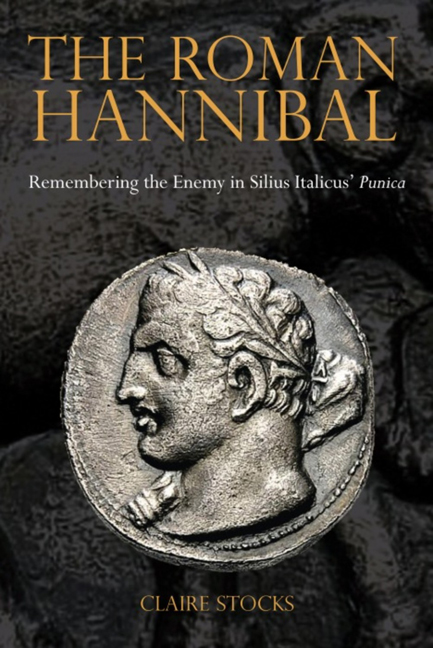Book contents
- Frontmatter
- Contents
- Acknowledgements
- Texts and Translations Used
- Introduction: Silius Italicus and the Roman Hannibal
- Chapter One The Roman Hannibal Defined
- Chapter Two Before Silius: The Creation of the Roman Hannibal
- Chapter Three Silius' Influences
- Chapter Four Epic Models
- Chapter Five Silius' Roman Hannibal
- Chapter Six Out of the Darkness and into the Light
- Chapter Seven Hannibal's Decline after Cannae: Separating Man from Myth
- Chapter Eight Imitators and Innovators
- Chapter Nine Band of Brothers
- Chapter Ten The ‘Lightning Bolts’ (Fulmina) of War
- Chapter Eleven The Man and his Myth: The Self-Defined Roman Hannibal
- Conclusion: The Crossing of the Worlds: The Move from Internal to External Narrative
- Bibliography
- General Index
- Index locorum
Chapter Nine - Band of Brothers
- Frontmatter
- Contents
- Acknowledgements
- Texts and Translations Used
- Introduction: Silius Italicus and the Roman Hannibal
- Chapter One The Roman Hannibal Defined
- Chapter Two Before Silius: The Creation of the Roman Hannibal
- Chapter Three Silius' Influences
- Chapter Four Epic Models
- Chapter Five Silius' Roman Hannibal
- Chapter Six Out of the Darkness and into the Light
- Chapter Seven Hannibal's Decline after Cannae: Separating Man from Myth
- Chapter Eight Imitators and Innovators
- Chapter Nine Band of Brothers
- Chapter Ten The ‘Lightning Bolts’ (Fulmina) of War
- Chapter Eleven The Man and his Myth: The Self-Defined Roman Hannibal
- Conclusion: The Crossing of the Worlds: The Move from Internal to External Narrative
- Bibliography
- General Index
- Index locorum
Summary
The Barcids and Scipiadae: Brother vs. brother
In the final stages of the Punica, Hannibal and Scipio stand as bulwarks of their states, individuals prominent amidst the many. Yet behind these two colossi stand the oft-forgotten partners of their labours – their brothers.
The ideal of Roman brotherhood was kinship of mind, body, and soul – on the battlefield a brother was your partner in arms, destined to fight with you, destined to die with you. In the Aeneid (9.672–716, 722–54, 11.396) Pandarus (mortis fraternae feruidus ira, ‘raging in anger at the death of his brother’, 9.736) and Bitias are two brothers who typify the motif of the brothers-in arms who fight and die together. Their fate is characteristic of Rome's literary portrayal of war as the forum in which fraternal solidarity could best be expressed for personal and state glory. Yet entwined with this ideal of fraternal pietas is the spectre of fraternal conflict and fratricide, epitomised by Romulus and Remus (e.g. Livy 1.6.4–7.3; Lucan 1.95) and Eteocles and Polynices (e.g. Stat.Theb.12.429–46). Thus the brothers of Silius’ Hannibal and Scipio are as much potential threats to their success as they are a source of support. The world of the Punica, where brothers both support and potentially undermine their siblings, reflects the wider context of Flavian Rome and the relationship of the brothers Titus and Domitian. In the Punica we see traces of this sibling rivalry and support as Domitian, the younger son, seeks to honour, emulate and surpass the success of his father and brother. In his speech to Venus in Book (3.571–629) Jupiter describes the future glory that awaits Rome culminating in the success and deification of the Flavians. Silius’ Domitian carries the burden (moles, 3.604) of his family and their legacy, but he emerges to surpass his family: at tu transcendes, Germanice, facta tuorum (‘but you, Germanicus, surpass the deeds of your family’, 3.607). In turn, Titus, the first-born son, is described by Silius as assuming the ‘weight’, moles, of his father: excipiet patriam molem celsusque feretur,/ aequatum imperio tollens caput (3.604–5).
The reality of the burden of a brother 12 years Domitian's senior is hard to discern. Much has been made by Rome's authors of Domitian's supposed plots against his brother (e.g. Suet.Titus.9.3, Dom.2.3) and the mercy shown him by Titus (e.g. Tac.Hist.4.51.2).
- Type
- Chapter
- Information
- The Roman HannibalRemembering the Enemy in Silius Italicus’ Punica, pp. 167 - 181Publisher: Liverpool University PressPrint publication year: 2014

